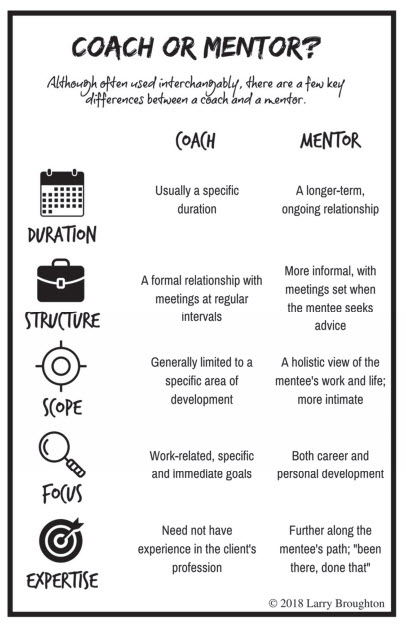
Entrepreneurs are often reluctant to ask for help because we’re such a self-reliant bunch. We tend to believe that we “should” be able to figure everything out on our own, and then make it all happen without any outside assistance.

We pick up this attitude because, it’s true, we really can take care of many things independently.
Unfortunately, this mindset leads to this bad way of thinking, “Don’t ask for help, it’s a sign of weakness.” This, of course, couldn’t be further from the truth. In this post, we’ll see how a coach or mentor can move Entrepreneurs further along the entrepreneur path faster—and how to find the right coach for you.
Avoid being the Lone Wolf Entrepreneur
Too many business owners buy into the myth and romance of the “Lone Wolf Entrepreneur” stylized by the popular media. Falling for this “go it alone” fable on your entrepreneurial journey puts both your short- and long-term success at risk. Following the Lone Wolf story line also virtually guarantees you will struggle harder (and longer) and waste more of your time and money on the way to success (if you make it at all).
Are there occasional Lone Wolf success stories? Sure. However, any objective analysis of their arduous path to eventual success reveals it’s strewn with decisions stemming from stubbornness and pride rather than clear strategic vision and analysis. In other words: yes, it could work … but don’t bank on it.
How Can a Coach be of Help?
Seeing the big picture clearly is often very difficult for entrepreneurs. We are so close to our businesses—nose to the grindstone, working frantically to meet deadlines, crafting and winning proposals, pushing completed projects and finished products out the door—that we might not be able to accurately or objectively judge what’s really transpiring.
We may miss opportunities that are literally right in front of us, overlook critical systems flaws that can completely derail our progress, or simply be running on four cylinders instead of eight. The right coach or mentor can help us step back, take in the bigger picture, and appreciate what it means. This gives us the clear perspective necessary for sustained success.

There are a number of ways in which the right coach helps you achieve a high level of enduring success:
1. The external view: Your coach offers perspective you don’t possess because you are too close to your business or too far down in the weeds. This external view is critical when making strategic decisions. Your coach helps you see what must be done, because, unlike you, s/he isn’t emotionally invested in your venture.
2. Challenging preconceived notions: Because coaches have a different set of knowledge and experience, they’ll challenge your beliefs, those things you just assume to be true.
3. Evaluating failures: Every entrepreneur will experience failures and the most important thing you can do is to learn from those failures. Conducting an effective After-Action Review is critical, otherwise you won’t internalize the lesson or be able to make timely adjustments.
Your coach provides the framework and support for meaningful review, and keeps you focused on taking course-corrective action—moving forward rather than beating yourself up or wallowing in self-pity.
4. Truth-telling: It’s really easy to fall in love with our own brilliant ideas and surround ourselves with people who tell us what we want to hear, instead of what we need to know. This is especially true as your organization grows because more and more of these people are added to your payroll!
Your coach is sufficiently removed from your circle and has your permission to tell you the unvarnished truth, even (especially!) when you might not want to hear it.
5. Keeping you on track: Yes, even high achievers sometimes struggle through down cycles. If we don’t recast our vision after a few wins, it’s tempting to just relax and coast for a while. But, beware! I once heard Brian Tracy say, “There’s just one direction to coast … and that’s downhill.” We’re all challenged with the occasional season of low motivation.
The input and inspiration of a coach or mentor could be just what you need to get back on the winning track.
6. Cheerleading: Finally, your coach is there to celebrate your successes. It’s always great to get a pat on the back, especially from someone else who also enjoys a significant level of success. More importantly, your coach helps you objectively evaluate your “secret success sauce,” how you achieved it, and learn how to replicate it.
Finding the Ideal Coach
There is no doubt that a great coach/mentor can help you reach the highest levels of success in virtually all areas of business and life. But how do you find the coach that’s right for you?
First, seek out a coach who specializes in the area in which you desire to see specific growth. It may be in fueling your personal, spiritual, relational, and professional growth.
The right coach is like a super-strength bottle of Windex®. Sometimes, being in business feels like barreling down a narrow highway at 90 miles per hour with a fogged-up, dirty windshield and a 1,000-foot drop off on each side of the road. One false move, and you’re headed for disaster!
A good coach helps you wipe away the grime to gain crystal clarity. They help you zero in on specific targets, internalize lessons from your successes and failures, and map out the most direct route to your objective.
You’ll want a coach who will challenge you to step up, break through the visible and invisible barriers keeping you stuck, and help you push powerfully through to the next level. Top business coaches and mentors have vast reservoirs of experience, knowledge, and connections.
They’re walking toolboxes filled with strategies to support you in making the leap from where you are to where you want to be.
These coaches have expansive networks and will leverage those networks to connect you with other key experts, potential clients/customers, and strategic partners. This type of coach is incredibly valuable and should be viewed as an investment, not an expense.
Teambuilding
Some of the most significant challenges in life can be overcome more easily with good ol’ teamwork. After all, teamwork makes facing life’s challenges a whole lot more fun!
The most successful entrepreneurs have a great team around them.
Why is it Important to Have a Great Team?
Hopefully, you surely recognize that the Lone Wolf approach to entrepreneurial success is not one you should embrace, as it significantly limits your ability to effectively start and grow your business on virtually every front. Understanding this point is crucial when building a winning organization. To put it bluntly, you will never create the business you envision, the life you desire, or the positive impact you are capable of creating without putting the right team in place.
Misconceptions about team expansion:
1. “It takes too long to train someone.”: While it’s true that training team members does take time, if you clearly identify your vision and values, and hire people who align with them, your training investment creates team members who magnify the strength and effectiveness of your organization.
2. “It’s quicker and easier to do things yourself.”: When you first hire someone, you probably can do their job more quickly than they can. You can also probably do it better than they can. So, what do you need them for? Ask yourself this: Are you doing the things at which you excel, those things that will result in long-term success for your business?
Or are you too busy doing the things others should be doing, the things in which they excel? Your team members will increase their speed and efficiency as they gain experience, provided you hire the right people – and leverage their strengths appropriately
3. “It’s too expensive to hire a team.”: Doing everything yourself is a waste of your time and energy, because you spend time doing things that don’t build your business. You’re significantly limiting your own success! Your team expands your ability to focus on what you’re best at, freeing you up to succeed.
Look at it this way: it’s actually too expensive not to hire a team. Makes a lot of sense, doesn’t it?
How to Build your Elite Team
A group could be any set of people who have something in common— attending a summit, or working in a certain field, for example. But it takes much more than warm bodies to make a team. A team is a group of people who also subscribe to a common mission. Each member of a team works with, and supports, the others for a greater good; a shared vision or goal.
That’s why your biggest task in team-building is to effectively communicate your own vision and values to your team members.
You need to communicate the vision and values of your company early on in the hiring process. You must be clear, open, and honest about what’s important in your organization. When you clearly outline your values and vision from the very beginning of the hiring process, it becomes much easier to attract the right people (and weed out the wrong ones).
People who buy into your vision will be much more motivated to accomplish great things, both for your organization and for themselves.
How to Sustain your Elite team
We’re delusional if we think we can simply gather a group of high achievers and expect them to perform as a team with enduring growth and success. But with some time, dedication, and occasionally some tough decisions, you will create an inspired, productive, and happy team that is aligned with your vision. And then, my friend, greatness is within reach.

Here are 5 tips to keep your team happy and motivated:
1. Listen to Team Members. Take the time to gather feedback from your team members to determine how they feel about their jobs, roles, and responsibilities.
You can do this through informal chats, confidential work climate surveys, formal information gathering meetings, etc.
2. Discover Their Goals. A significant part of the listening process involves asking team members about their long-term goals and ambitions.
This not only demonstrates you’re interested in the professional development of your team, but gives you the opportunity to uncover some hidden talent or skill that could benefit the organization.
Help team members develop an action plan to reach their goals.
3. Praise Good Work Publicly. Catch them doing something right! During a busy workday, it’s easy to overlook the accomplishments of the team members and mention only their mistakes.
An occasional handwritten note acknowledging achievements to let them know you appreciate their daily effort goes a long way toward providing motivation and building morale.
4. Make Corrections Quickly and Privately. If you notice a team member doing something incorrectly or behaving in an unacceptable manner, don’t let the situation escalate. Without delay, talk to the team member in private.
5. Set an Example. Show team members how they should go about their work by setting an example. If you expect teammates to follow through on promises to customers, set a positive example by fulfilling your promises




